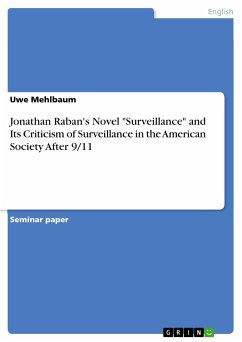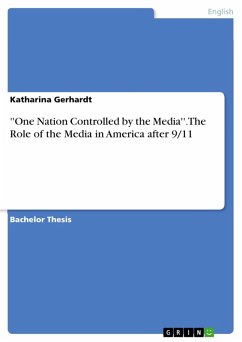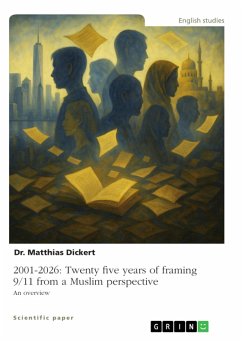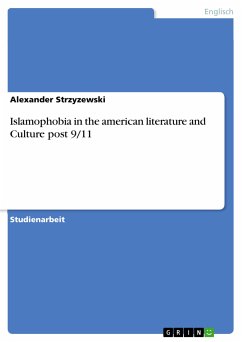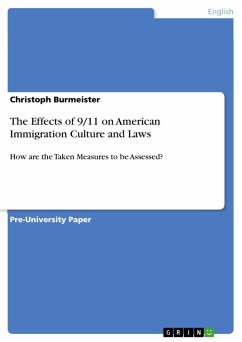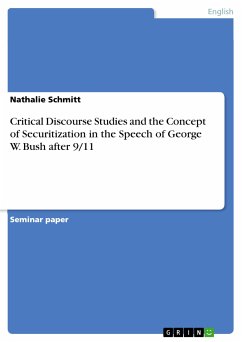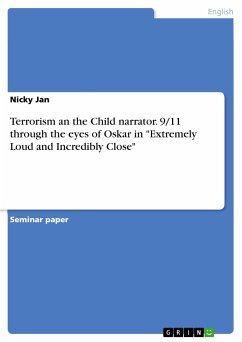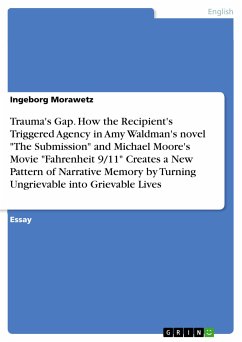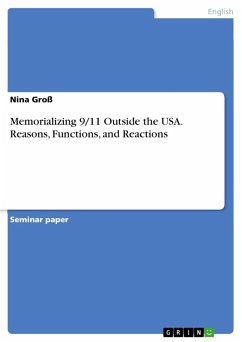
9/11 in Literature and Film (eBook, PDF)

PAYBACK Punkte
0 °P sammeln!
Examination Thesis from the year 2008 in the subject English Language and Literature Studies - Literature, grade: 2,0, Christian-Albrechts-University of Kiel, language: English, abstract: "Nach Auschwitz ein Gedicht zu schreiben, ist barbarisch"1 This is a famous quotation by Theodor W. Adorno. It may surprise to find it at the beginning of a thesis paper called "9/11 in Literature and Film". Obviously, the amount of victims of the Holocaust and 9/11 differ enormously, and the events are therefore incomparable. However, many people have labeled the attacks on the World Trade Center and Pentago...
Examination Thesis from the year 2008 in the subject English Language and Literature Studies - Literature, grade: 2,0, Christian-Albrechts-University of Kiel, language: English, abstract: "Nach Auschwitz ein Gedicht zu schreiben, ist barbarisch"1 This is a famous quotation by Theodor W. Adorno. It may surprise to find it at the beginning of a thesis paper called "9/11 in Literature and Film". Obviously, the amount of victims of the Holocaust and 9/11 differ enormously, and the events are therefore incomparable. However, many people have labeled the attacks on the World Trade Center and Pentagon that happened on September 11, 2001 as the major catastrophe of our times; irreversibly changing the world we live in. Causing a trauma and massive grief to many people and leading to further deaths in Afghanistan and Iraq (civilians as well as soldiers), the attacks have huge significance for today's worldwide political and social situation. For example, the issue of withdrawing the troops from Iraq is a major point of discussion in the ongoing presidential candidate debate between Barack Obama and Hillary Clinton. It is the question of how one can do justice to the many victims of 9/11 and its aftermath by means of literature and film. Is it possible to put trauma and grief in words, and maybe even contribute to overcome these states and accept reality? This will be the central focus of this thesis paper. To examine how 9/11 is represented in literature, I have chosen to examine three novels and one collection of comic strips. These have been written by very different authors: a hyped youngster, an old hand at fiction about politics and terrorism, an Englishman and a comic-strip artist who has before dealt with the Holocaust in a graphic novel. This indicates a great variety of how to come to terms with the traumatic experience; however, they share more than may be visible at first sight. Additionally, I will analyze two films, a documentary and a mainstream Hollywood feature and show how these films surprisingly similarly tackle issues of loss and grief.
Dieser Download kann aus rechtlichen Gründen nur mit Rechnungsadresse in A, B, BG, CY, CZ, D, DK, EW, E, FIN, F, GR, HR, H, IRL, I, LT, L, LR, M, NL, PL, P, R, S, SLO, SK ausgeliefert werden.




